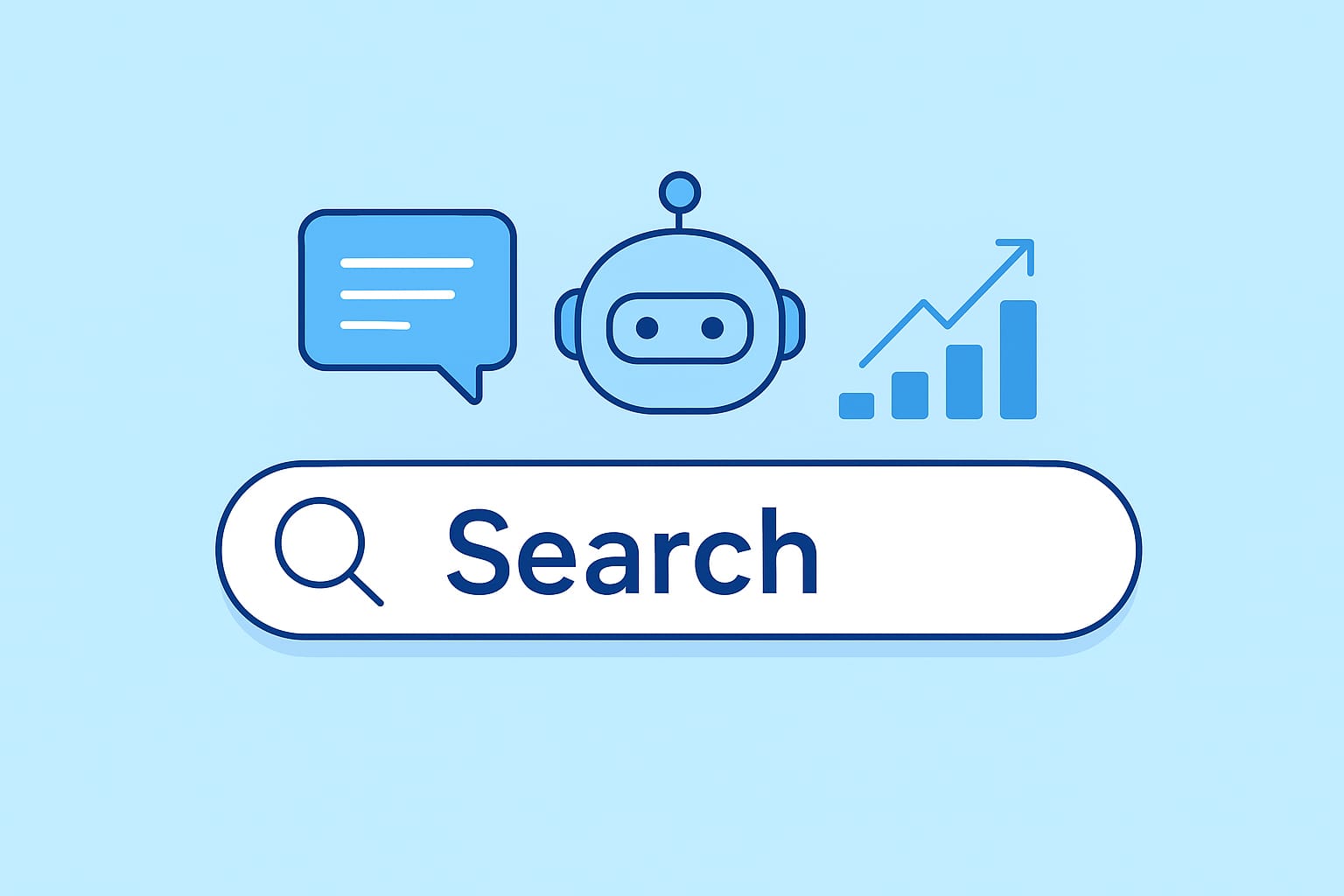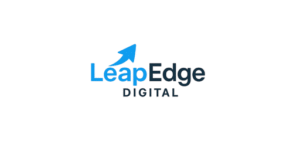Latest Shifts Shaping Search Right Now
Search isn’t standing still. To stay visible, small businesses must adapt quickly
The current shifts in Defining Search are reshaping the way people find brands, products, and information online. Google, once the sole gateway, now shares the stage with platforms like TikTok for product discovery, YouTube for tutorials, and AI assistants for instant answers.
For example, YouTube is now the world’s second-largest search engine, and TikTok, which drives daily engagement with over half of its users, are becoming a key player. Additionally, platforms like ChatGPT and Perplexity are handling millions of queries every month, further diversifying the search landscape.
For small businesses, the key to visibility lies in being present on multiple platforms, not just Google. The new search landscape requires a comprehensive approach that covers social apps, local listings, and AI-driven tools.
In this guide, we’ll explore the most significant shifts shaping search and provide practical, data-backed strategies to help you adapt. From SEO and content optimisation to schema-ready FAQs designed to capture rich snippets, these strategies will ensure your business is visible wherever your customers are searching.
Key Takeaways
- Search is no longer confined to a single platform. While Google continues to lead, the emergence of YouTube, TikTok, Bing, and AI assistants as primary discovery channels underscores the importance of optimising for a diverse range of platforms.
- Embrace the potential of AI-driven search engines. Natural, conversational keywords (e.g., “how to increase online visibility for small businesses”) are proving to be powerful tools across voice, AI-driven, and traditional search engines, opening up new avenues for optimisation.
- Google’s AI updates. “AI Mode” in Search is being tested, surfacing more links and context within AI answers to increase clicks to websites, not reduce them.
- SEO is adaptable and thriving. Despite the chatter, SparkToro’s research found that 95% of Americans still use search engines on a monthly basis, with 73% of clicks going to organic results. What this means is that AI is not replacing SEO; it is rather enhancing strategies, speeding up research, and opening new ways to optimise.
- Ad rules and transparency. Microsoft faced backlash over faint Bing ad labels and is redesigning them, while Google Ads Performance Max now offers account-level reporting for better oversight.
- Monetisation is evolving. AI search is starting to reward publishers: Perplexity.ai’s “Comet Plus” has raised $42.5 million in subscriptions, sharing 80% of the revenue with publishers based on visits and AI citations.
- Content and UX reign supreme. High-quality, user-centric content coupled with robust UX continues to be the winning formula. SEO drives nearly 1,000% more traffic than organic social media, while 40–53% of users abandon sites that take three seconds or more to load.
- Local and mobile matter. Google Maps is testing new UI updates like reorganised place cards and an “Explore” tab. And with 76% of smartphone local searches leading to a same-day visit, mobile visibility is crucial.
How Emerging Search Trends are Redefining Online Visibility
Online visibility refers to how easily customers can find your business on any platform they use. For example, if a potential customer searches for a service you offer, whether on Google, YouTube, TikTok, or an AI chatbot, you want to appear in those results. In practical terms, better visibility leads to more clicks, visits, and customers, while poor visibility means being overlooked.
For small businesses, visibility is crucial. Local searches are essential; for example, searches containing “near me” number over 1.5 billion per month according to SEO.com. Consumers expect relevant, helpful results whenever they search, and they trust businesses that rank highly. Good visibility combines strong search engine rankings (SEO), optimised social and video presence, local listings, and mobile-friendly experiences.
In 2025’s complex search landscape, the fundamentals still apply: create valuable content, use relevant keywords (such as “how to increase online visibility for small businesses”), and ensure a fast and user-friendly site.
However, you now also need to optimise beyond Google by considering other search channels, such as YouTube keywords and TikTok tags, and ensuring your content can be cited by AI tools. With that mix of content strategy and technical optimisation, your business will take the modern path to being found online.
Current Shifts Shaping Search Every Business Needs to Know
This section provides a comprehensive overview of the latest updates from major search and advertising platforms.
As a business owner, understanding these updates will help you stay ahead in the digital marketing landscape, as they can significantly impact your online visibility and marketing strategies.
Search and advertising platforms have introduced many updates. Here are the most important ones for business owners:
-
Google AI-Enhanced Search
Google is experimenting with a revamped AI-powered search interface that embeds more source links directly in answers. As Search Engine Journal reports, Google’s Robby Stein said they are testing carousels and inline links in AI Overviews to encourage clicks to publishers.
In other words, Google aims to send more traffic back to websites via its AI-powered search engine features. This is a win for content creators worried about zero-click answers.
-
Search Usage Trends
Traditional search engine use remains strong. SparkToro’s Rand Fishkin notes that 95% of Americans still use search engines each month (seroundtable.com), virtually unchanged despite the rise of AI tools.
SparkToro research also found that the number of “heavy” search users (10+ searches daily) has increased slightly, from 84% to 87% of internet users (sparktoro.com).
Takeaway: SEO isn’t dead – people still search the web regularly.
-
Search Console Link Report
The Google Search Console Links report no longer shows a “Last updated” timestamp. Barry Schwartz noted this absence, and Google’s John Mueller had no apparent reason.
Implication: trust-but-verify your backlink data, as the freshness of that report is less transparent (seroundtable.com).
-
Microsoft Ads Ad Labelling
Bing Ads faced backlash for hard-to-see “Sponsored” labels on search results. Microsoft’s Ads Liaison, Navah Hopkins, replied on social media that they “appreciate the push” for clearer ads and will discuss improvements internally.
For advertisers, the blurred distinction between ads and organic results could impact click-through rates, so be mindful of how ad spots appear in Bing search results.
-
Microsoft Ads Suspensions
Microsoft Advertising published official “dos and don’ts” for handling account suspensions. Key advice: complete advertiser verification and use the appeals process (don’t create new accounts or pay third parties to reverse a suspension).
This three-strikes policy means suspensions are taken seriously. Businesses should document verifications and appeals carefully, as regaining access is more challenging once it has been suspended (seroundtable.com).
-
Google Ads Updates (Performance Max)
Google has added account-level reporting for Performance Max campaigns. Previously, PMax performance data was siloed by campaign; now, you can view unified channel-level results across all PMax campaigns.
This helps advertisers identify cross-campaign trends and allocate their budget more strategically (Search Engine Land). Google notes this was the top-requested feature.
-
AI Search Monetisation
Perplexity AI launched “Comet Plus,” an AI browser subscription that shares revenue with publishers (digiday.com, searchenginejournal.com).
They’ve pooled $42.5M from subscriptions and will pay out 80% to content creators based on user engagement, including human site visits, AI answer citations, and agent-driven tasks.
This is one of the first large-scale attempts to monetise AI answers, signalling a potential new income stream if users discover and read your material via AI tools.
-
Content vs. Inbound
In marketing strategy, “content marketing” is outpacing “inbound marketing”. Google Trends and the Content Marketing Institute show interest in content marketing surging, while inbound marketing remains flat (contentmarketinginstitute.com).
Practical advice: focus on creating valuable, audience-driven content (blogs, videos, social media stories) rather than relying solely on lead-magnet funnels. Original, helpful content builds visibility and trust today.
-
Zero-Click and AI
Expect more “zero-click” searches, where answers appear directly on the page. Bain & Company finds that about 80% of people rely on search results without clicking through at least 40% of the time, and roughly 60% of queries on Google end without a click.
Business implication: optimise for visibility within featured snippets and knowledge panels, and focus on brand and conversion signals.
-
Mobile & UX
Google is enhancing security and AI on Android, requiring developers to verify identity before sideloading APKs to block malware.
For web UX, page speed is crucial: slow sites lose customers. Analysis shows that 40–53% of users abandon pages that take longer than 3 seconds (demandsage.com).
Fast-loading, mobile-responsive sites remain essential for rankings and UX. Google’s Gemini AI overlay on Android adds a new pill-shaped interface, rolled out in August 2025 (9to5google.com
-
Local & Maps
Google Maps is getting a UI refresh. Updates include a reorganised settings menu, coloured map-view icons, a new “squircle” Street View thumbnail, and an “Explore” tab (androidauthority.com, phonearena.com).
These changes are in testing, suggesting iterative improvements to Maps UX. Businesses should keep Google Business Profiles updated, as Maps remains a major discovery tool.
What Shift-Shaping Trends in Search Mean for Your Business
-
More search clicks via AI: Google’s focus on linking out from AI-powered answers should help websites drive traffic back to their sites.
-
No panic on AI: Traditional search use is growing, according to SparkToro. Continue investing in SEO; it remains a vital strategy.
-
Ads transparency matters: Pay attention to how ads are labelled, especially on Bing, as it could impact click-through rates.
-
Compliance is crucial: Follow updated ad guidelines carefully to avoid suspensions and account issues.
-
New monetisation paths: Explore revenue opportunities on AI platforms, such as Perplexity’s model that rewards content creators.
-
Content & UX remain king: High-quality content and fast user experience continue to drive the majority of traffic and conversions.
-
Local & mobile focus: With Maps UI changes and the importance of “near me” searches (76% of mobile searches lead to a store visit), ensure your local listings and mobile site are fully optimised.
Looking Ahead
As we look at the latest shift-shaping trends, it’s clear that Google will keep refining its AI-powered search to balance providing helpful on-page answers with driving clicks. As these features develop, other search platforms are also likely to introduce publisher payouts to reward original content.
At the same time, regulators and users will continue to demand ad transparency, so we can expect updated labelling guidelines across platforms to ensure clarity and trust.
In this environment, SEO fundamentals remain critical. Fresh, trustworthy content, solid technical quality, and in-depth, authoritative material will continue to drive rankings and engagement. As AI becomes more prevalent in search, brand authority and content depth will play an even greater role in ensuring visibility and maintaining user trust.
Make the most of the latest search and ad updates, read this article, Top Strategies to Increase Online Visibility.



3 thoughts on “11 Shifts Shaping Search Right Now”